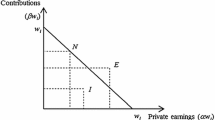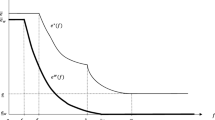Abstract
This article investigates conditions under which high prices, in conjunction with low levels of pollution, signal environmentally clean products. It is shown that, when consumers cannot ascertain the environmental performance of products, the price must be distorted upward to signal a clean product. A clean producer saves less from emitting pollution and so raises price and restricts output with less reluctance than does a dirty producer. The theoretical result of over-pricing is consistent with the evidence that “green” products receive higher prices than conventional products. However, optimistic prior beliefs of high-environmental performance may cause signaling to fail.
Similar content being viewed by others
References
Akerlof GA (1970) The market for ‘lemons’: qualitative uncertainty and the market mechanism. Q J Econ 84:488–500
Arora S, Gangopadhyay S (2003) Toward a theoretical model of voluntary overcompliance. J Econ Behav Organ 28:289–309
Bansal S, Gangopadhyay S (2003) Tax/subsidy policies in the presence of environmentally aware consumers. J Environ Econ Manage 45:333–355
Bagwell K, Riordan MH (1991) High and declining prices signal product quality. Am Econ Rev 81:224–239
Baumol J, Oates WE (1975) The theory of environmental policy, 2nd edn. Cambridge University Press, Cambridge
Buchanan JM (1969) External diseconomies, corrective taxes and market structures. Am Econ Rev 59:174–177
Cason TN, Gangadharan L (2002) Environmental labelling and incomplete consumer information in laboratory experiments. J Environ Econ Manage 43:113–134
Cremer H, Thisse J-F (1999) On the taxation of polluting products in a differentiated industry. Eur Econ Rev 43:575–594
Foulon J, Lanoie P, Laplante B (2002) Incentives for pollution control; regulation or information? J Environ Econ Manage 44:169–187
Innes R, Bial JJ (2003) Inducing innovation in the environmental technology of oligopolistic firms. J Ind Econ 3:265–287
Kolstad CD (2000) Environmental economics. Oxford University Press, Oxford
Kotchen MJ (2006) Green markets and private provision of public goods. J Polit Econ 114:816–834
Laffont J-J (1994) Regulation of pollution with asymmetric information. In: Dosi C, Tomasi T (eds) Nonpoint source pollution regulation: issues and analysis. Kluwer, Dordrecht, pp. 39–66
Mailath G (1987) Incentive compatibility in signaling games with a continuum of types. Econometrica 55:1349–1365
Mailath G, Okuno-Fujiwara M, Postlewaite A (1993) Belief-based refinements in signaling games. J Econ Theory 60:241–276
Milgrom P, Roberts J (1986) Price and advertising signals of product quality. J Polit Econ 94:796–821
Nimon W, Beghin J (1999) Are eco-labels valuable? Evidence from the apparel industry. Am J Agric Econ 81:801–811
Spence AM (1976) Informational aspects of market structure: an introduction. Q J Econ 90:591–597
Tietenberg T (2000) Environmental and natural resource economics. 5th edn. Addison Wesley Longman, Reading, MA
Tinbergen J (1956) Economic policy: principles and design. North-Holland, Amsterdam
Tirole J (1988) The theory of industrial organization. MIT, Cambridge, MA
Author information
Authors and Affiliations
Corresponding author
Rights and permissions
About this article
Cite this article
Mahenc, P. Are green products over-priced?. Environ Resource Econ 38, 461–473 (2007). https://doi.org/10.1007/s10640-007-9084-9
Received:
Accepted:
Published:
Issue Date:
DOI: https://doi.org/10.1007/s10640-007-9084-9




